‘Macaulay Culkin would try to make me laugh during takes’: An oral history of Home Alone
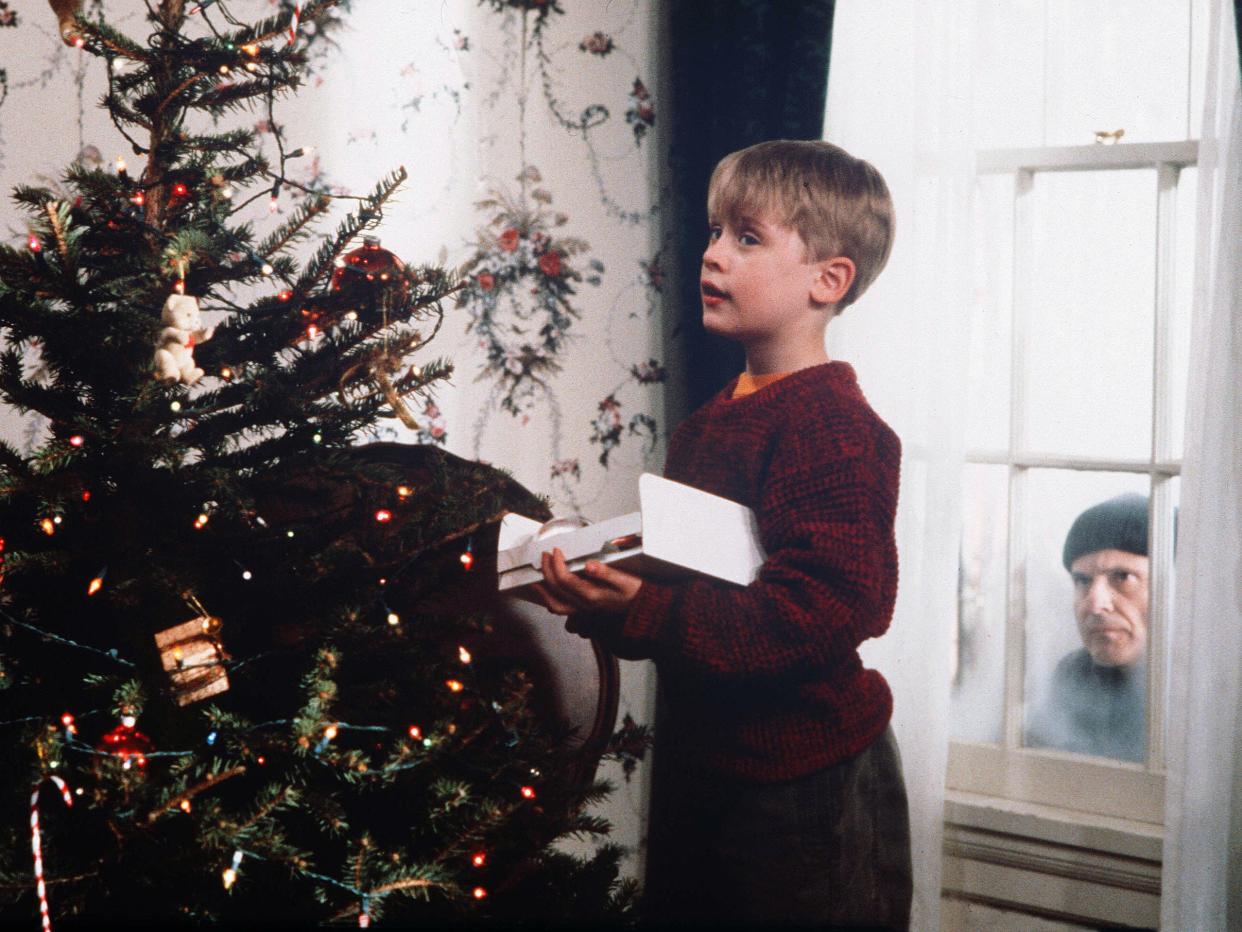
Macaulay Culkin and Joe Pesci in the 1990 smash hit
(Rex)Few Christmas films have achieved the same warm and fuzzy modern classic status as Home Alone. Released 30 years ago this week, director Chris Columbus’s low-budget family comedy saw a plucky young boy forced to defend his home from a couple of dimwitted burglars after he’s accidentally left behind from his family holiday. Set to a magical score from movie maestro John Williams and with a script by Eighties teen-genre giant John Hughes, Columbus’s film was draped in cosy reds and deep greens and packed with mischievous charm. It went on to defy box-office expectations and change the life of its talented young star Macaulay Culkin. Three decades later, we spoke to Columbus, star Devin Ratray, editor Raja Gosnell and casting director Janet Hirshenson about crafting a feel-good Christmas gift that keeps on giving…
After wondering what might happen if he accidentally left one of his own kids home alone, writer-director John Hughes began work on a script, with an eye on newcomer Chris Columbus as its potential director...
Chris Columbus (director): I desperately needed a job and was on the verge of probably never directing again, having done a film that was a complete flop. John [Hughes, writer] offered me National Lampoons’ Christmas Vacation and probably thought I was completely insane for bailing. It’s common knowledge that I did not get on with Chevy Chase. He’s an impossible human being and I just couldn’t make a picture with him – it’d be like making a film with Donald Trump. So I quit and I think John, in his own way, admired that: the fact I had everything to lose and nothing to lose. Two weeks later, he sent me two scripts – one of which was Home Alone. He’s basically responsible for me continuing to work as a director today.
Raja Gosnell (editor): John was an amazing writer. What he did so well was that outsider-look inside a family. The way Kevin [McCallister, played by Macaulay Culkin] is set up in those early scenes, everyone can remember being that kid, feeling like everyone was picking on you and the injustice of a situation – yet you don’t think the parents are bad people or the brothers and sisters are horrible. He just found that zone.
Columbus: Home Alone appealed to me in the same way Gremlins appealed to me [Columbus’s second screenwriting credit]. A lot of people consider Christmas the happiest and most emotional time of the year and I love the contrast of setting a movie like Gremlins or Home Alone against that backdrop. To me, what’s going on in Home Alone is the polar opposite of Christmas but set against that particular backdrop, it becomes a new beast.
Janet Hirshenson (casting director): I’d worked with John and Chris before on different projects. John had written Home Alone with Macaulay in mind because he’d just directed him in Uncle Buck, so I quickly looked to see if there was anybody besides Macaulay. It was a quick and limited search. I needed a little boy who would still be believing in Santa Claus. I did a quick sweep of New York and Chicago and nope – there wasn’t anyone better than Macaulay.
Columbus: No one else had whatever quality Mac had. He felt like a real kid but was also incredibly charming and extraordinarily funny. He just had this charm. Mac was slightly imperfect too, which was great. One ear was kind of bent, he didn’t look like other kids – but everyone who met him fell in love with him and for me, that’s a movie star.
After financing issues resulted in a last-minute studio switch from Warner Brothers to 20th Century Fox, Columbus and his extensive cast of newcomers and comedy pros entered production...
Devin Ratray (Buzz McCallister): It was just another audition except it was a John Hughes film and that was particularly exciting. I didn’t know Chris at the time, but he put me at ease right away. He was so remarkably easy to get along with that I didn’t consider it this big audition; I just had a nice conversation with a really fun guy. We read scenes, he directed me and I walked out feeling elevated, relieved and not stressed out thinking I could've done better. We had no clue it was going to become the massive behemoth it has become.
Hirshenson: I cast a lot of kids and it’s one of my favourite things to do. [When casting Kevin’s family] there needed to be a certain familiar resemblance, but you didn’t want to get too crazy. Almost all of the kids came out of Chicago where the film was shot. We saw a whole bunch of kids – it wasn’t so much about their reading, more about their persona.
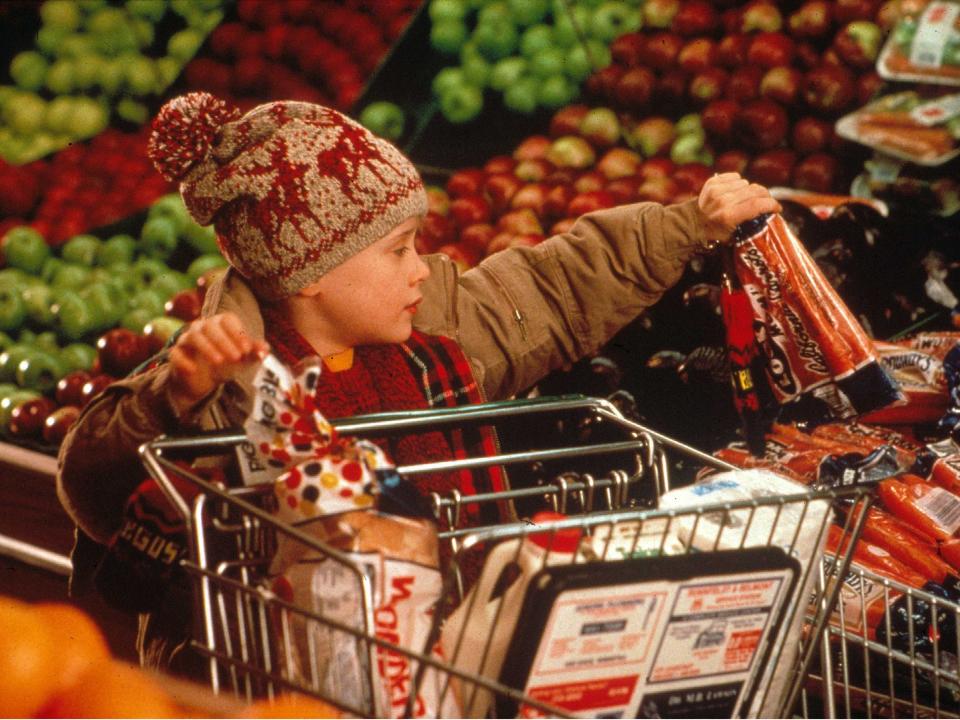
‘He just had this charm… he didn’t look like other kids’
RexColumbus: It was my first experience directing so many kids and I realised you have to be a performer. For a kid who hasn’t done a lot of film and doesn’t have a lot of experience on film sets, you have to be off camera and basically feeding them the lines and the performance. That was a collaboration between Macaulay and myself – and he was game for that. It’s an exhausting job and I’m a masochist because I’ve done it too many times in my life (laughs).
Ratray: My relationship with Macaulay formed very naturally. He has many siblings and an older brother who was my age so he related to me quite naturally and we would play around a lot. All the kids would try to make me laugh during takes and during my close ups. Mac was very frustrated that I was stone faced and he couldn’t break me up but I could get him easily. A nine-year-old doesn’t stand a chance against my comedic chops (laughs).
Gosnell: Mac had an abundance of energy. Kids tend to wear out pretty quickly but take four, five, six – he was still bringing it. Mac nailed the comic timing and facial expressions. Chris worked with him in terms of line reads and how the rhythm of a line might go. Sometimes they were like a ping-pong game: Chris would say the line the way he would hear it and Mac would repeat it. It was a beautiful system that came up with a great performance. There was a lot of material to choose from.
Hirshenson: Catherine O’Hara had a lovely mother look but she was definitely off-kilter and very funny and John Heard was the opposite. I don’t think he’d ever been in a comedy before but turned out really nice. He wasn’t the go-to funny guy.
Ratray: Unfortunately, there was very little time to play around [on set] because kids still gotta go to school while shooting. We had to bank three hours of school a day on top of the eight-hour working day, so any breaks we had that were longer than 20 minutes we were in school. We were shooting in a giant closed down high school and the production made the mistake of giving us racer scooters to get from class to set quicker. That idea didn’t last too long (laughs). We’d end up literally in the Principal's office or a science lab. The PAs were getting quite a work out chasing after us trying to get us back on set. We were just craving any type of child time.
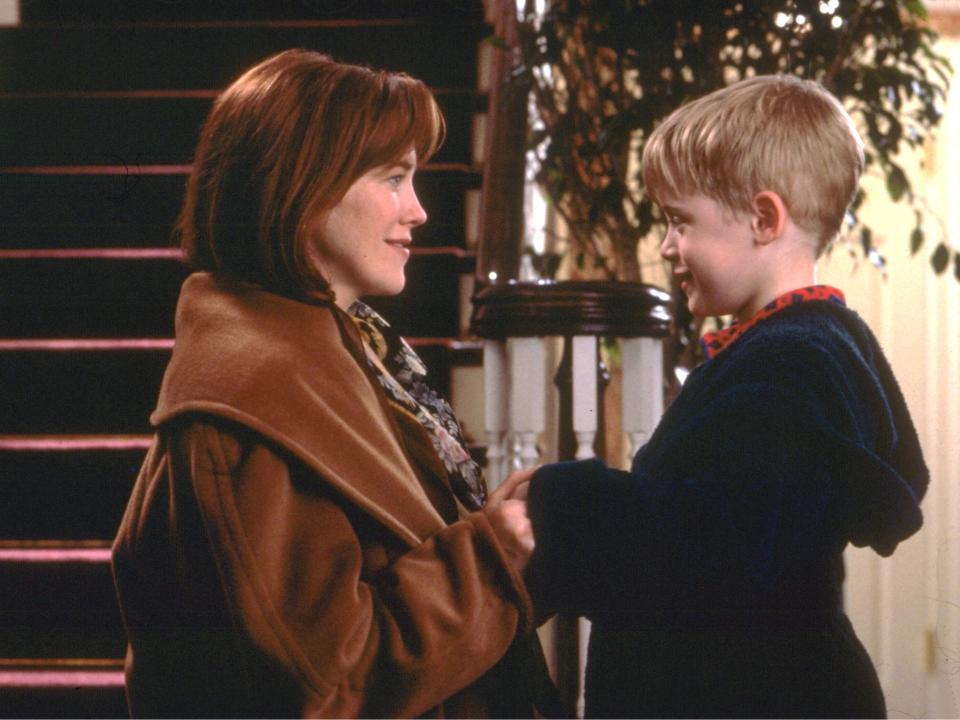
Catherine O’Hara and Macaulay Culkin
RexLeading the assault on Kevin’s home were The Wet Bandits – Joe Pesci as Harry and Daniel Stern as Marv – two bumbling burglars in a film packed with a host of stand-out smaller roles and one unusual set visitor...
Columbus: The studio initially felt that Daniel Stern [Marv] was too expensive, so we hired another actor [Daniel Roebuck] and when we did the first screen test, there was absolutely no chemistry between him and Joe so unfortunately he had to be let go. I begged the studio to get me Daniel Stern. They agreed to pay him and the first time the two of them were together they immediately hit it off. They had this incredibly intense chemistry and who would’ve expected Joe Pesci to play this particular comedic role?
Gosnell: Cussing was kind of built into Joe Pesci’s persona. It was really on him as an actor to figure out how to keep that Joe Pesci-edge without using those words so it turned into “ratchata fratchita, why you little…” Once in a while he’d slip, and I’d have to pop in a different thing, but he was super aware of that and found alternative words in place of what we all know the real words would’ve been.
Columbus: The last time I was talking to Martin Scorcese he said to me, “You know, every time I worked with Pesci, all he talks about is that the only thing he gets recognised for is Home Alone. Kids keep coming up to him all the time to talk about Home Alone.” I said “I’m sorry. What can I say? He’s done his greatest work with you – but I apologise for that.” (laughs).
Hirshenson: I love doing the small parts because the wrong actor in even the smallest part is like a little flat tyre in a movie. The Pizza Boy was just a Chicago guy who was really quirky and wonderful. My favourite was the old man neighbour Marley [Roberts Blossom]. You needed a guy who you took one look at and thought, ‘OK, he could be an axe murderer.” He had such a good, scary face but was a lovely actor.
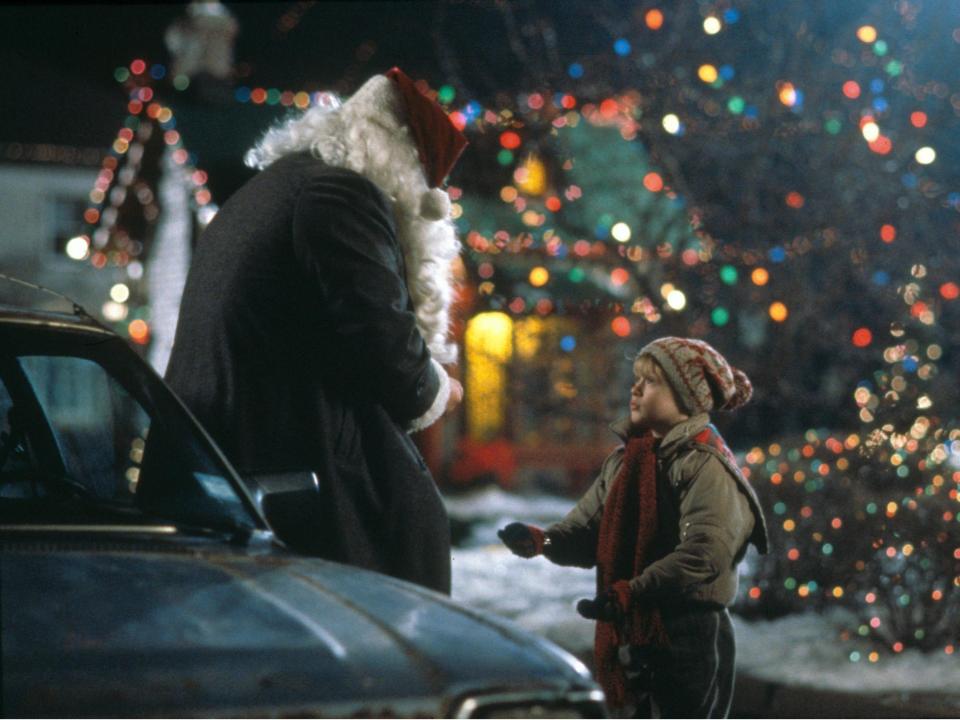
Chris Farley auditioned to play Santa, but was unsuccessful
RexColumbus: [Chris Farley] auditioned for the Santa Claus role and he was not in particularly great shape. We had an 8am audition with him on a Saturday morning and I’ll never forget it. Chris and I knew each other from New York because we went to the same church on Sundays. I’d see him and we’d talk and he was the sweetest guy in the world. He came in and I don’t think he had gone to sleep that night so the audition did not go particularly well. I regret it. I think he would’ve been great in the film but I do love the guy who played Santa Claus [Ken Hudson Campbell]. He was very funny.
John Candy was cast as the travelling polka musician who helped O’Hara’s Kate travel home...
Columbus: John Candy is on the list of the three greatest actors I’ve ever worked with in terms of personality, their devotion to the craft and their genuine enthusiasm for making films. John’s possibly the nicest human being who ever walked on this Earth and was up for anything. His entire role was shot in a long, 24-hour shoot – which would never happen today. A lot of that role was improvised by John and Catherine. That entire story in the van about John being locked in the funeral parlour with the corpse? He just made that up on the spot. That was not in the script. I wish there was a way to put more of John in the movie but it didn’t fit the pacing of the film.
Ratray: [Interviewing Michael Jackson on set] was a lifelong memory. I was shooting a homemade documentary with my giant video camera and Macaulay brought me up to him and said, “Can Devin interview you?” Surprisingly, without hesitating, Michael said, “Sure.” We had to pause whilst rehearsing because Michael had to use the bathroom. Nobody even knew he was coming to set, let alone that I’d be able to interview him. He had a music video out at the time called “Do You Remember” and in it he kisses Iman. I didn’t know what to ask so I said, “Hey, how was that kiss with Iman?” He just burst out laughing. As soon as that happened, he immediately let his guard down and we talked normally – as completely insane and outlandish as that situation was.
In a movie full of memorable moments, two stand out: the 1940s-esque noir film-within-a-film Angels With Filthy Souls and Harry and Marv’s climactic madcap attack on Kevin’s booby-trap-filled house...
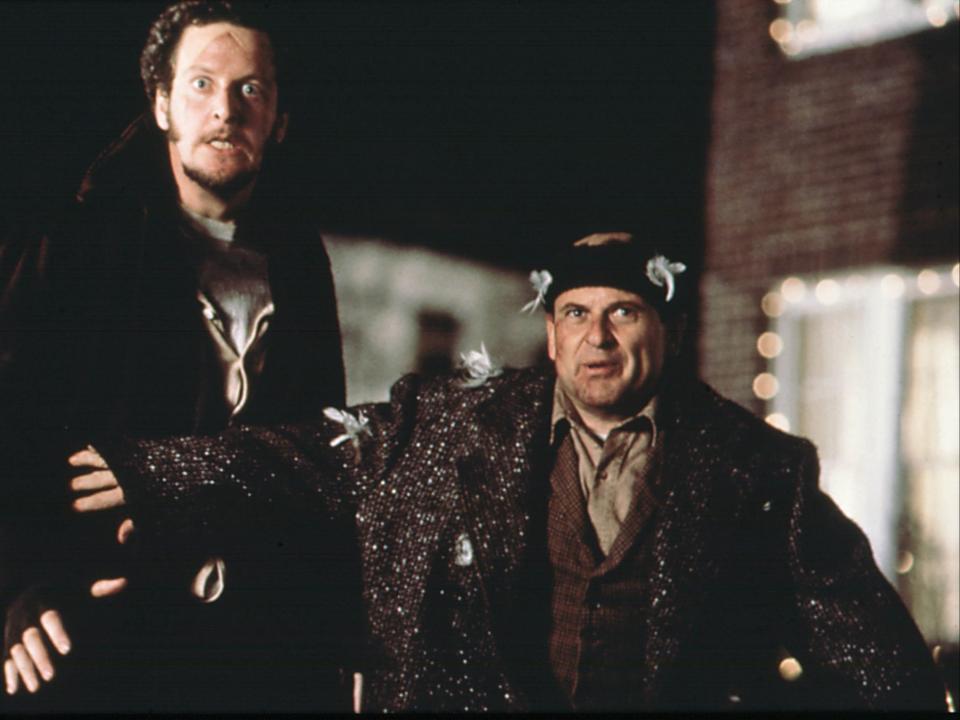
Daniel Stern and Joe Pesci
RexHirshenson: Ralph Foody played the main guy Johnny. He was very well known around Chicago and just perfect. The other guy Snakes was a local Chicago actor and the young woman I thought felt like a dame from a Forties movie – and here I had a Forties movie. It came together pretty quickly but Ralph Foody was the key to it.
Columbus: We were shooting on actual black-and-white film which gives it that quality. It’s like The Lighthouse, the film I produced a couple of years ago with Robert Eggers. I shot that kind of the way Eggers shot The Lighthouse which is piece by piece so it’s edited in your head. I didn’t shoot Angels With Filthy Souls the way I shot the rest of Home Alone or any other film I’ve done. I shot it piece by piece and with no room for editing, so there’s no room for mistakes. You have to shoot exactly what you need.
Gosnell: When you watch the assault on the house, they’re basically all rhythms: there’s an elaborate set up, then you see the trap get tripped, then there’s a moment where you rest and then you ramp up to the next one. It’s very vignette-y and pretty well mapped out. It wasn’t like you could throw the cards up in the air and they could fall any which way and it’d work – they all had beginnings, middles and ends. Really the only trick was making sure it didn’t hurt.
Columbus: We built the inside of the house but the outside we had to shoot on location. The actual film cameras froze and stopped working two of those nights because it was so cold. I remember every detail, particularly the stunts because they were done by these two incredible stuntmen for Harry and Marv. It was all done practically – there’s no visual effects in the movie and every time we’d do a stunt, it’d appear a stuntman was near death and in real physical trouble. It wasn’t funny at all.
Gosnell: You held your breath when the stunt guys threw themselves off of the house steps five feet into the air and landed on concrete. What was happening to those guys was extremely painful so what we did was mix in enough real sound effects and cartoon sound effects and constructed the music in such a way that it felt cartoony enough that people would laugh instead of going, “Ow!”
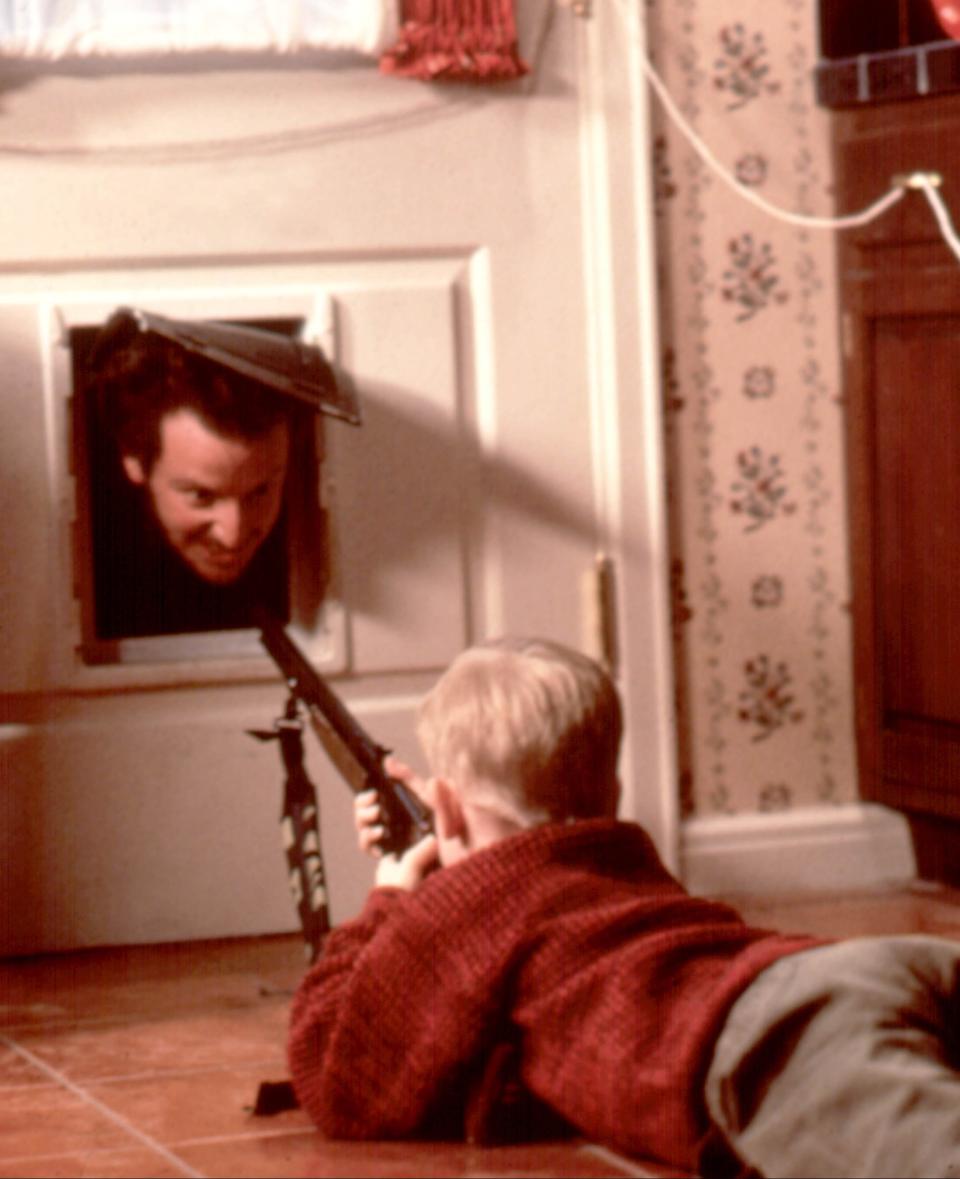
Marv meets his match
RexColumbus: I’d yell cut and everyone was silent. I’d walk up to the stunt men and say, “Are you OK?” and they’d say “Perfect, no problem!” We’d go back to the monitors and watch the playback and that’s when we realised it was hilarious. That particular part of the shoot was fraught with anxiety because I was really worried for their safety. I haven’t seen stunts quite like that in terms of slapstick comedy in a film since. Home Alone was like the Wild West for stunt work.
Released on Nov 16 1990, ‘Home Alone’ went on to become an unexpected megahit, dominating the No 1 spot at the box office until early February 1991. Thirty years later, it remains a modern festive classic...
Gosnell: The movie just took off and was number one. There was the famous Siskel and Ebert review at the time which was terrible, so the fact the public loved the movie and kept loving the movie was like, “Well, this isn’t marketing – this is people actually loving the movie and seeing it multiple times.” It was a nice validation.
Columbus: The feeling of seeing the film at number one at the box office week after week – I think it lasted for 14 weeks or something – was remarkable. We just couldn’t believe it and part of that is the fact we weren’t playing in 3,000 theatres, we were probably playing in 900, so the film was sold out a lot and you got to see a comedy with a packed audience – and there’s no better way to see a comedy. It’s a joyous experience, so for me, that was incredible.
Ratray: Everybody feels like they know me because they’ve been watching me every year for 30 years. They have no problem coming up to me and being like “I hate you!” I’m like, “Oh, have we met?” and they’re like “No, but I hate you!” (laughs) They say it smiling and I don’t take offence but they absolutely feel the urge, especially young men who were 8 or 9 when the movie came out and clearly had older brothers or siblings they could relate Buzz to. They love Macaulay so much, they take it rather personally that I’m so insensitive to him – but I take that as a compliment and tip my hat to John for writing it and Chris for directing it so brilliantly.
Gosnell: The fact that it still comes around every year feels good. It’s like having that favourite dish you only cook once a year around the holidays. If you could watch it every week, you wouldn’t – but you watch Home Alone and it feels good to be back. You know what to expect yet it still delivers. That’s the most gratifying thing – that 30 years later, it still achieves what it set out to do.
Columbus: Over the past couple of years, the onslaught of turning on the television after Thanksgiving through to New Year’s Day – it’s just always on. I think, “Wow, this has just lasted” and it feels good because at the time, the film got mixed reviews critically, but now it’s entered into its own thing. It’s kind of a worldwide phenomenon and it’s nice to have that be part of your legacy.


